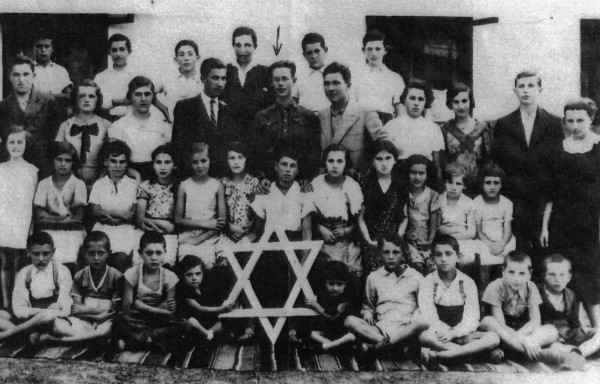 |
|
|
[Page 59]
47°41' 26°15'
by Yosef Berntal and Simcha Weissbuch
Translated by Moshe Devere
Iţcani was a small town on the Austrian–Romanian border until World War I, on the banks of the Suceava River on the slopes of the city that bore the same name. It is surrounded by green fields and forests in summer and covered by snow in winter. There was a diverse population including Romanians, Jews, Germans, Schwabians, Ukrainians and Lipovans, with each group speaking its own language.
Although the Jews were a minority in the town, the mayors were always Jews, such as Disho and Shmuel Hellman, who was later appointed head of the Suceava community. He was an assistant to a member of Parliament and his son, Dr. Adolf Hellman, later served as mayor of the town. In 1923-1924, most of the Jews of Bucovina lost their Romanian citizenship, but Dr. Adolf Hellman because of his position, managed to add thousands of Jews living in different cities, to the Iţcani community list, proving that they were citizens, and Kozhukro, mayor of Suceava approved the records.
Dr. Yosef Goldstein, who later served as head of the community, contributed greatly to its development. Industrialist Jacob Roessler, served for a long time as a representative of the community in the municipality and as deputy mayor of Iţcani. In 1934, Adolf Kolber was appointed the last mayor from among the Jews of Bucovina before the deportation to Transnistria. The chairman of the Zionist organization was Katz; members of the leadership were Fekhtholt and Dr. Goldstein.
There were factories around the town such as a sugar factory, a leather-processing plant (owned by Roessler), a wood-nail factory (owned by Landman, Strominger and Fekhtholt), as well as a garage next to the train station. In the center of the town, was a cinema and a park that served as a hangout for the old and young. During the summer, the tennis court was open to everyone and performances by the local orchestra were held in the park. In winter, the park served as an ice-skating rink. In the center of the town were the public institutions, the local council offices, two churches and two synagogues, a state elementary school and a kindergarten, government offices and a gendarmerie (police) station.
The Jewish community, which numbered some 50 households before World War II, took part in all economic, social and political activities and influence town life. The Jews were merchants, factory managers, senior officials in government and public institutions, workshop owners. They were also active in other professions as doctors, lawyers and engineers.
In political life, Jews were members of the liberal Romanian parties. The community
[Page 60]
was divided into religious, traditional, and secular. Many were sympathetic to the Zionist idea and joined Zionist parties such as the General Zionists, Revisionists, and left-wing parties. Many also donated to Zionist causes; the JNF box was found in most homes.
As said before, there were two synagogues in Iţcani: The Great Synagogue where prayers were held every day of the week, and a small synagogue where they prayed only on Shabbat and holidays. The congregation had a butcher and a modest institution for helping the needy.
The community's social activity was concentrated in gatherings held in a hall near the Great Synagogue. This activity found expression in lectures and readings from literary works by Jewish writers, organized by WIZO. Similarly, the community also maintained its own Jewish education system, the ḥeder, in parallel with the government education system.
The ḥeder teachers, melameds (teachers), with beards and side-locks “beat the Torah” into the young children (meant literally: freely-handed out corporal punishment). The studies included reading and writing in Yiddish, learning Torah, prayers, Jewish customs and traditions, preparations for Bar-Mitzvah ceremonies and calling up to the Torah. When it was difficult to find a traditional teacher, Zionist teachers who knew how to teach in Hebrew were also employed and inculcated the Zionist idea in their students. Likewise, they also prepared plays about the life of the pioneers in Eretz Israel and talked about Hebrew workers, the kibbutz, and the problems of life alongside Arabs.
|
|
| Zionist Youth's Iţcani ken: Isidore (Yitzchak) Bodinger, the counselor, is marked by an arrow |
[Page 61]
There was an active ken of the Zionist Youth in the town, where lectures were held. But their main activity was singing and dancing. Some of the town people (such as Mina Lupovici) underwent training during this period. Some fulfilled the Zionist idea of emigrating to Eretz [Israel], among them was Isidor (Yitzchak) Bodinger, whose son Herzl became an officer in the Israeli Air Force.
|
|
|||
In the fall of 1940, all the community's activities were discontinued with the emergence of the Romanian Nazi organization, “The Iron Guard.” Antisemitism increased, as did the vilification and incitements against Jews. Bearded [Jews] were forced to shave them off on Friday night. Jews were recruited for forced labor and held as hostages.
In October 1941, the Jewish community was deported to Transnistria. More than 90% of the community were exterminated there. Some of them were transported across the Bug River by the Germans where they were murdered. Among the murdered were the Tillinger families, Dr. Goldstein, Berntal, Engineer Perry Fischler, Rakover and many more.
|
|
JewishGen, Inc. makes no representations regarding the accuracy of
the translation. The reader may wish to refer to the original material
for verification.
JewishGen is not responsible for inaccuracies or omissions in the original work and cannot rewrite or edit the text to correct inaccuracies and/or omissions.
Our mission is to produce a translation of the original work and we cannot verify the accuracy of statements or alter facts cited.
 Suceava, Romania
Suceava, Romania
 Yizkor Book Project
Yizkor Book Project
 JewishGen Home Page
JewishGen Home Page
Copyright © 1999-2025 by JewishGen, Inc.
Updated 14 Dec 2021 by JH